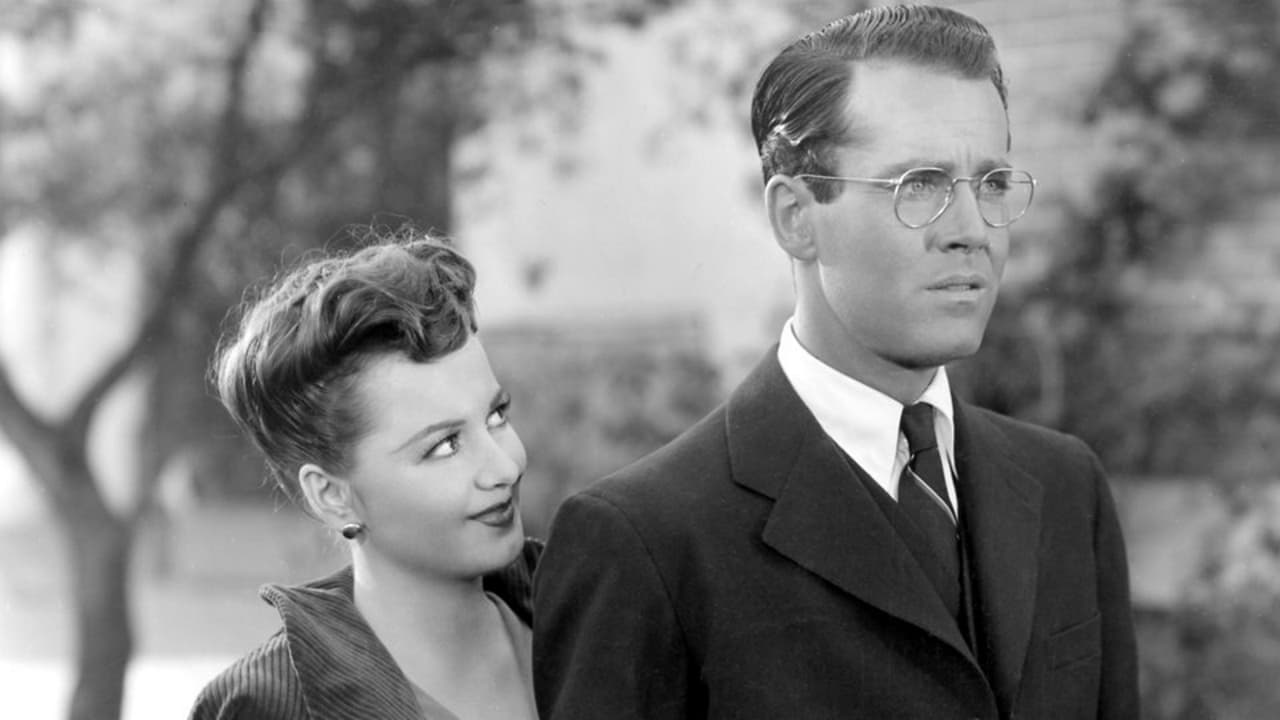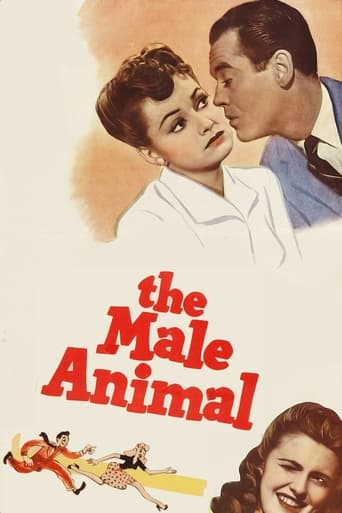

One of producer Hal B. Wallis' best films, this is a delightfully brittle comedy of manners with great production values including an A-1 cast (Henry Fonda, Olivia de Havilland, Joan Leslie, Jack Carson. Eugene Palette, Hattie MacDaniel), smartly directed by Elliott Nugent, who played the Fonda role on Broadway. The James Thurber—Elliott Nugent stage play has been ingeniously opened out, though still retaining most of its smart talk. Fonda is superb, and receives excellent support from the entire cast, including – most unexpectedly – Don DeFore who has by far his best cinema moments here. True, he and Herbert Anderson seem a bit old for college kids, but who's worrying?
... View MoreJames Thurber is best recalled for his wonderful cartoons (mostly printed in The New Yorker magazine in the 1920s through 1950s) and his remarkably fine short stories and essays. He recently got an ultimate accolade (posthumously) by having a volume of his prose and cartoons published in "The Library of America" series. The two longest pieces of writing that he created that people remember are his short story, turned into a film, "The Secret Life of Walter Mitty", and his other short story turned into a television dramatization, "The Greatest Man in the World". Also his writings were the basis of a wonderful television series (in 1969 - 1970) "My World And Welcome To It" starring William Windom. Quite a bit of mileage for Thurber's work.He only (as far as I know) wrote one play. He collaborated with Elliott Nugent on THE MALE ANIMAL, a comedy set on a college campus, that dealt with the limits of free speech and academic freedom on a college campus. Tommy Turner (Henry Fonda), and English professor in a mid-western college, is happily married to Ellen (Olivia de Havilland) when two disasters hit him in one weekend. One of his students, Michael Barnes (Herbert Anderson), is the editor of the college newspaper, and he writes an article praising Turner's outspokenness and encouragement of democracy, and mentioning that Turner is going to conclude a course on great epistolary (letter) writing with the final letter of Bartolomeo Vanzetti, the convicted anarchist murderer(?) / martyr. This turns out to be unwelcome publicity to Tommy. Secondly it is timed for the alumni weekend, when the arrivals include the bullying head of the Board of Trustees Ed Keller (Eugene Palette) and Tommy's former rival for Ellen, Joe Ferguson (Jack Carson).Sex and the battles of the sexes play as much a role in the play as does political correctness and censorship. First off, Michael/Anderson apparently wrote the article because of his disappointment concerning his floundering romance with Patricia Stanley (Joan Leslie), who has been showing interest in the football hero of the campus Wally Myers (Don De Fore). This younger triangle mirrors the older one of Fonda, de Havilland, and Carson. Fonda is a fine teacher, but he was giving a pep talk to the disheartened Anderson. That was why he wanted to show his appreciation in writing his piece in the paper.Everyone on campus is upset by Fonda's choice of literary example. Carson (now a successful car salesman, whose marriage is rocky and he can't understand why), feels it's wrong. So does de Havilland, who can't understand why Fonda would jeopardize his job by reading that anarchistic trash. And Palette is livid - a prime example of super capitalism triumphant, he has no use for those trouble-making lefties like Vanzetti. And since Palette is the head of the Board of Trustees, his anger can't be simply brushed aside.The play has many nice moments in it - Carson and Palette reliving football glories of the past, with the winning "Statue of Liberty" play, that Fonda manages to simply reduce to absurdity that Carson is left wondering what happened when he is literally ball-less. The pep talk that Palette gives regarding messages from various people who can't come in that weekend - and how banal the messages from all of them are. The attempts by Fonda to protect De Havilland with an unsuspecting (and surprisingly honorable) Carson in case Fonda's future is over. And the climax, when the letter is read to the entire school body.It is still quite an effective movie, though not thought of among Fonda's or de Havilland's leading performances. Interestingly enough, the letter (while still a masterpiece of English prose) is now known to have been ghost written between Vanzetti and a news reporter who befriended him. But that does not take away from it's effectiveness. As a study in the pros and cons of free speech and academic freedom, you could not do wrong starting out with this film.
... View MoreI was born in one year before this movie was made. Therefore, I went to public school where the teachers were terrorized by HUAC. While the film reflects the racism that prevailed in the country, at the time, with the character of the maid, the censorship of the Professors makes the film relevant to our time. Many of the teachers of the fifties were blacklisted for similar acts of instruction that are reflected in this movie. Such political statements are as relevant today as when the film was made. Simply exchange the label "Liberalisism" for "Radical Islam," and the mood of those in control is very similar. In addition to the racism, the film is hurt by the stereotypes of the intellectuals as weak and whinny, and the jocks as too dumb to understand what is happening around them. This was one of Jack Carson's better films.
... View MoreThe lyrics of Jerome Kern's "Who" resonate throughout this movie as the lead characters battle one another, both rhetorically and physically, for answers to the big question "Who?" Who does Ellen Turner (Olivia de Havilland) really love? Who does Ed Keller (Eugene Palette) like? Who invited Joe Ferguson (Jack Carson), erstwhile beau to Ellen and football hero/legend at Midwestern U.? Who will save Ellen and Tommy from themselves? Who can save Michael Barnes (Herbert Anderson) from "Hot Garters" Gardner (Jean Ames)? Who is Wally Myers (Don DeFoe), the current football hero, really courting? Joe or Patricia (Joan Leslie)? And who is Bartolomeo Vanzetti? and what does he have in common with people like these? Tune in to the song: i.e. "Who stole my heart away?/Who makes me dream all day,/Dreams I know will never come true,/Seems like I'll always be blue./Who makes my happiness?/Who would I answer yes to?/Well, you oughta guess, Who? No one but you." Don't guess.See the movie. You not only gotta see the movie, but you gotta hear it, too.
... View More